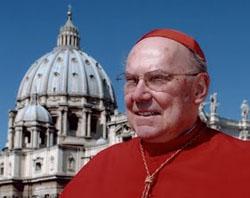By David Kerr
Catholic News Agency
May 16, 2011
http://www.catholicnewsagency.com/news/vatican-sets-may-2012-deadline-for-global-abuse-guidelines/
 |
| Cardinal William Levada |
The Catholic Church is giving bishops worldwide until May next year to draw up new guidelines for dealing with cases of child sex abuse.
The deadline is included in a new letter that the Vatican’s Congregation for the Doctrine of the Faith has sent to the world’s bishops.
“The aim is to give bishops a strong common denominator for drafting guidelines appropriate to their own national situation, with its unique culture and legislation,” said Vatican spokesman, Father Frederico Lombardi, SJ, at a press conference releasing the document May 16.
The letter is dated May 3 and is signed by the doctrine congregation’s head, Cardinal William Levada. It gives nine recommendations for bishops and episcopal conferences to consider:
--The sexual abuse of minors is a grave crime. Because of that all credible allegations should be referred to the Vatican.
--The person who reports the abuse should be treated with respect.
--The local Church should offer spiritual and psychological assistance to victims.
--The initial inquiry into any allegations should respect privacy and the good name of those involved.
--The accused priest should be informed of the accusation and given opportunity to respond unless there is serious reason not to do so.
--The ultimate responsibility for handling the case lies with the local bishop, although advisory groups or experts can assist.
--The law in each country regarding the reporting of such allegations to civil authorities should be followed.
--During the investigatory stage the local Church still has a duty of care towards the accused person.
--While always innocent till proven guilty, a priest can be removed from public ministry if their continued presence would endanger minors or cause scandal.
Fr. Lombardi says these nine points should help to provide a common approach throughout the world.
“Countries like the U.S., U.K., Germany and Ireland already have similar guidelines but the idea is to push other conferences where problems have not been so pronounced.”
The guidelines employed by the U.S. bishops arguably go further than today’s Vatican suggestions. American priests can be being suspended automatically during any investigation if the bishop deems the evidence significant enough.
Presently those countries which choose not to have guidelines – such as Italy – are guided by canon law and by a papal directive issued by Pope John Paul II in 2001. At that time, he raised the age at which a person is deemed to be a minor from 16 to 18.
That directive’s provisions were significantly strenghtened by Pope Benedict XVI last year. He increased the time-limit under which cases can be brought against alleged perpetrators from 10 to 20 years after a victim’s 18th birthday and created a fast-track by which guilty clerics can be dismissed from the priesthood. The downloading or distribution of child pornography was also added to the list of grave offenses.
Today’s guidelines are another reflection of Pope Benedict XVI’s attitude towards what he’s previously called the “filth” of clerical sex abuse.
The Vatican’s guidelines also say the Pope provides the model for how a bishop should deal with the issue. The new letter highlights “his availability to meet with and listen to the victims of sexual abuse” over the six years of his pontificate. It also quotes his 2010 pastoral letter to the Catholics of Ireland.
“You have suffered grievously and I am truly sorry. I know that nothing can undo the wrong you have endured. Your trust has been betrayed and your dignity has been violated.”
The Vatican is also suggesting preventative measures, including better screening of applicants for the priesthood.
“Particular attention, moreover, is to be given to the necessary exchange of information in regard to those candidates to the priesthood or religious life who transfer from one seminary to another, between different dioceses, or between religious Institutes and dioceses.”
The Vatican also said that formation should continue after ordination.
“Priests should be well informed of the damage done to victims of clerical abuse. They should also be aware of their own responsibilities in this regard in both canon and civil law. They should as well be helped to recognize the potential signs of abuse perpetrated by anyone in relation to minors.”
Any original material on these pages is copyright © BishopAccountability.org 2004. Reproduce freely with attribution.